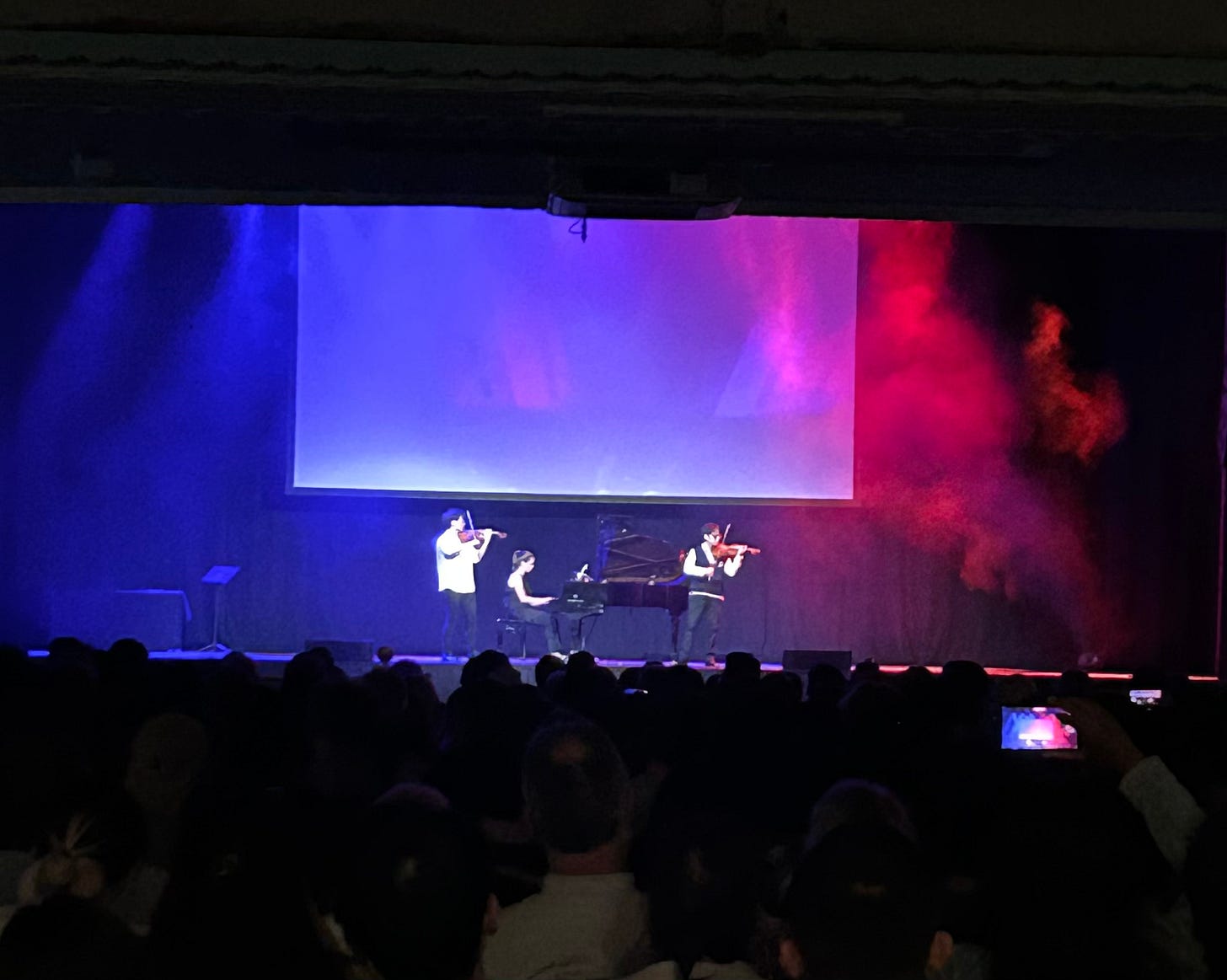TwoSet at the Troxy
Two Australian orchestral violinists have found millions of fans for classical music with their hilarious and geeky videos. I went to the London leg of their world tour to find out their secret
Two queues wrap around the entire block of a magnificent art deco building in East London. Stretching as far as the eye can see, the neat crocodile is perfectly behaved and wildly diverse: small kids with their parents, huddles of trendy teenagers, middle-aged couples – every size, shape and colour. The bouncers seem a little bemused, more used to rock-gig and club-night audiences. A curious local steps up to ask one what’s on. ‘Dunno mate. Two violinists,’ he answers, shrugging.
This was not some fever dream brought on by the relentlessly gloomy classical music news I absorb on Twitter. It was TwoSet Violin’s show at the Troxy in Limehouse last night. If you don’t know who TwoSet are, presumably you haven’t been anywhere near the internet for the last few years. They are Brett Yang and Eddy Chen, barely-30-something friends from maths club and youth orchestra, who as violinists in Sydney and Queensland Symphony Orchestras, respectively, started making comedy classical music videos in 2013.
They found that the geekier their content, the more fans they won over, so the further they went – ranging from silliness and jokes about violin practice, tiger mums, technique and the fictional prodigy Ling Ling to in-depth analysis of performance styles and serious topics such as teacher instrument commissions. Within ten years they have built a following of 7.5 million followers across social media and 4 million on YouTube (their tagline: ‘We play violin. We love classical music. We love to Practice’). They crowdfunded their first international tour in 2017 and returned to London for one night only yesterday on their 30-stop, mainly sold-out world tour, the ambition of which would put most pop stars to shame.
And so they make their entrance in rock style – a warm-up band (pianist Sophie Druml playing Liszt’s Mephisto Waltz), flashing arena lights and the obligatory few minutes late. Their first question to the delighted crowd is suitably nerdy: ‘Who here has practised today?’ Most hands stay down (mine included) to much hilarity. From there they move through some of their favourite YouTube themes – Violin Charades, Perfect Pitch, Spot the Piece, the audience screeching along interactively (the first time I’ve ever heard ‘Hilary Hahn’ used as a heckle).
Just as they’re about to play the Handel–Halvorsen Passacaglia, a masked man from the ‘classical music Academy’ appears on screen and orders them to ‘cease and desist’, putting them through some gruelling musical tests to prove their talent. It’s a cute device that leads to more music (all beautifully performed, even while hula hooping, blindfolded or running around the stage) and smuggles in some key subtexts about music, such as the importance of communication and playing together. They even manage a dig at YouTube for their false copyright infringement bans.
Throughout, they hold the audience in the palm of their hands – pin-drop quiet during the music, delirious during the comedy (although inevitably there were too many video screens in the way for my liking). They do it without any arrogance or conceit, though, constantly mocking themselves and each other, as well as the vagaries of violin playing, the establishment ‘Academy’ itself, and viola players (obviously).
But classical music is supposed to be so boring and elitist and exclusive etc etc, isn’t it? So how do they manage to engage such a large and diverse audience? They may not be presenting three hours of Bruckner or contemporary music, and the audience is self-selecting as violin geeks, but even so, they have created a universe where classical music really matters.
This is down to Brett and Eddy themselves – funny, smart, knowing, creative, irreverent, passionate and authentic. They manage to tap into aspects of classical music that sometimes get lost in more earnest conversations – the sheer fun of learning the violin, with all its challenges, and the feelings of striving, focusing on minutiae, being part of a community and caring about something deeply. Their gamification of classical music might upset purists, but it perfectly suits digital natives and belies a profound knowledge of classical music – as well as being a whole lot of fun. When I was Editor of The Strad, getting into nitty-gritty detail for the geeky audience was always a joy, but I found more light-hearted aspects harder to pull off well. Somehow, in their videos and stage performances, Twoset have found the sweet spot.
What can the classical music world learn from TwoSet? Certainly, on a technical level, their digital activity around videos, social media, fan clubs and merchandise is a case study in how to monetise classical music without compromising on quality or values (see also Ray Chen, with whom they worked from early on).
At a more philosophical level, though, classical music people might learn to have more faith in their own product. TwoSet prove that classical music doesn’t have to be dumbed down. Quite the opposite: harness the detail, the depth, the passion, the challenge, the aspiration. And for politicians? I’ve never been in such a well-behaved, joyful audience, so if you want a happy, well-adjusted population, give them music education – and hire Twoset as your consultants.
As they take their final crowd selfie from the stage, rather than the usual ‘cheese’, we are exhorted to shout, ‘Go practise!’ Buoyed by reconnecting with my inner string geek, I might just follow their instruction – after all, I’ve got my 40 hours of practice to fit in today.




